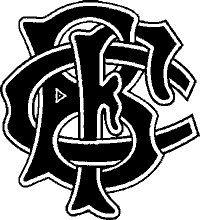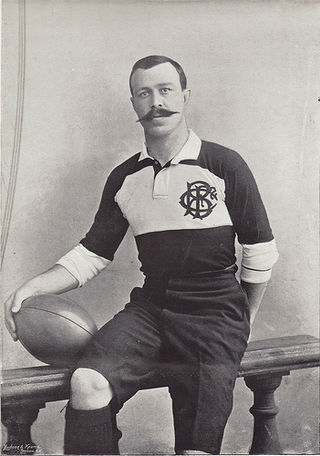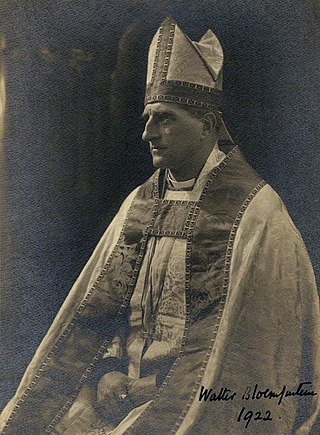
The Barbarian Football Club, known as the Barbarians, is a British-based invitational rugby union club. The Barbarians play in black and white hoops, though players wear socks from their own club strip. Membership is by invitation. As of 2011, players from 31 countries had played for them. Traditionally at least one uncapped player is selected for each match.

William Percy Carpmael was the founder and first president of the rugby union Barbarian Football Club. Carpmael was born the eldest of eight in Briscobel, Streatham in England.
Sydney Pyman Bell was an English rugby union halfback and solicitor. Bell played club rugby for Cambridge University and Northern and played international rugby for the British Isles XV in their 1896 tour of South Africa.
Osbert Gadesden Mackie was an English rugby union centre and Anglican priest. Mackie played club rugby for Wakefield Trinity, and Cambridge University and county rugby for Yorkshire. Mackie played international rugby for the British Isles XV on their 1896 tour of South Africa and on the return from Africa he was awarded two caps for the English team.
Randolph Littleton Aston was an English rugby union centre who played club rugby for Blackheath and Cambridge University and was a member of the first official British Isles tour in 1891.

The Rt Revd Walter Julius Carey was an English Anglican clergyman and author who served as Bishop of Bloemfontein in South Africa from 1921 to 1935. Carey was a rugby union forward who played club rugby for Oxford University and Blackheath and played international rugby for the British Isles XV in their 1896 tour of South Africa.

Herbert Waddell was a Scottish rugby union fly-half who played club rugby for Glasgow Academicals and international rugby for Scotland and the British Isles. Waddell was heavily involved with the invitational tourist team, the Barbarians, not only playing for the club, but also became the fifth president of the club in 1973
Howard Marshall OBE was an English rugby union half-back who played club rugby for Blackheath and Richmond and was a member of the first official British Isles tour in 1891. Marshall played just one game for England, scoring a hat-trick of tries on his debut. It is thought, through historical records and the detective work of Sunderland based sport and social historian Keith Gregson, that Marshall sustained a severe knee injury which curtailed his rugby career.
William Henry Thorman was an English rugby union forward who was a member of the British Isles XV that toured South Africa in 1891. Despite playing for Cambridge and the British Isles, Thorman was never awarded a national cap.
Clement Pearson Simpson OBE was an English rugby union forward who was a member of the British Isles XV that toured South Africa in 1891.

Frank Moxon Stout MC also referred to as Frank Moxham Stout, was an English international rugby union forward who played club rugby for Gloucester and Richmond. Stout played international rugby for England and was selected for the British Isles on two tours in 1899 and 1903. On the 1899 tour of Australia, he acted as on field captain for three of the Tests.
George Ralph Gibson was an English international rugby union forward who played club rugby for Northern. Gibson played international rugby for England and was selected to represent the British Isles on their 1899 tour of Australia. He was described by Matthew Mullineux, the British Isles captain, as a "capital worker".
Thomas Sherren Whittaker was an English rugby union forward who was a member of the British Isles XV that toured South Africa in 1891. Whittaker was also an original member of invitational touring team, the Barbarians

Alexander Findlater Todd was an English rugby union forward who played for Cambridge University and Blackheath F.C. at club level, and Kent at county level. Todd played international rugby for England and later represented the British Isles team on their 1896 tour of South Africa.
William Thomas Charles Cave was an English international rugby union forward who played club rugby for Cambridge and Blackheath. Cave played international rugby for both the British Isles and England, and was also selected for invitational team the Barbarians.
Lt. Colonel Gilbert Faraday Collett DSO was an English sportsman who was an international rugby union wing and first-class cricketer for Gloucestershire County Cricket Club. As a rugby footballer he represented Cambridge University and Cheltenham at club level. Collett also played international rugby for the British Isles during the 1903 tour of South Africa but was never selected for the England national team.
Charles Edward Wilson was an England rugby international and British Army officer who was killed during the First World War.
Hamilton Augustus Haigh Smith was an English first-class cricketer, stockbroker, rugby union player and administrator.
Charles Henry "Cherry" Pillman was an English rugby union international who played on 18 occasions for his country and was part of the first official British Isles team that toured South Africa in 1910. He played club rugby with Blackheath and county rugby for Kent. Pillman's speed and tactics made him one of the leading exponents of an attacking wing forward, now recognised as the flanker position.

Maurice Edward Neale was an English rugby union international who played on a single occasion for his country and was part of the first official British Isles team that toured South Africa in 1910, finishing top try scorer of the series.








